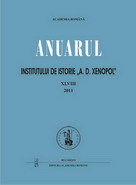Justiţie şi fiscalitate în cazul mănăstirilor închinate din Moldova (sfârşitul secolului XVI-secolul XVII)
JUSTICE AND TAXATION IN MOLDAVIA (LATE 16th CENTURY – 17th CENTURY): THE CASE OF THE “DEDICATED MONASTERIES”
Author(s): Cătălina ChelcuSubject(s): History
Published by: Editura Academiei Române
Keywords: taxation; dedicated monasteries; criminal penalties; fiscal privileges
Summary/Abstract: Both the subject of our research and the periodical classification we propose are tightly related to Moldavia’s politico-juridical relationships with the Ottoman Empire, which have direct implications in the domestic political structure and financial organization, in the criminal code practices. In the 17th century, the subordination to the Ottoman Empire increased. Afterward, the Phanariote regime introduced in 1714 implied the administration of the two countries like quasiprovinces of the Empire, with the help of Princes of Greek origin, directly appointed by the Sultan, with no consultation of the indigenous political class. These foreign Princes’ particular situation led to a political conduct that was their specific one, thus unavoidably determining a significant modification of the Romanian traditional world structures. In our investigation, this will be underlined by analysing the documents that mention criminal penalties that attest the execution of punishments, out of which the most frequent one was the redemption of the offence by paying a sum of money. We must say that the number of such papers is a limited one among the written documents, most of them being acts issued in the aftermath of civil trials and making no distinction between civil and criminal issues as far as the procedure is concerned. These situations are to be explained by the absence of the written motivation for the court order in jurisdictional procedure. Such procedure, consisting in the quoting, in the order, the juridical norm that the judges were referring to when making the decision, became compulsory after Constantin Mavrocordat’s request. This is one further reason to establish temporary limits to cover the 17th century and the first half of the 18th one. A particular problem are the fiscal immunities acquired by some of the Moldavian monasteries. Among these privileges, there is the levying, by these monasteries, of the fines (“gloabe”) for serious offences (“big deed”) like murder. By right, the investigation of the offences was the responsibility of the Prince, who was also levying the fine, established according to the gravity of the crime. Consequently, we insist upon this aspect pertaining to the relation between two institutions, the Principality and the Church, in the period we have in view, from the perspective of some juridical and fiscal privileges that the monasteries were entitled to. For that, we follow the way in which the criminal fine levied by the Prince or his tax farmers becomes both a modality to punish and a source of incomes. Continuing this idea, we intend to motivate the levying, by some monasteries, of the quantum of punishment for murder (duşegubina), usually meant to the princely court.
Journal: Anuarul Institutului de Istorie »A.D. Xenopol« - Iaşi
- Issue Year: XLVIII/2011
- Issue No: 48
- Page Range: 41-61
- Page Count: 19
- Language: Romanian

